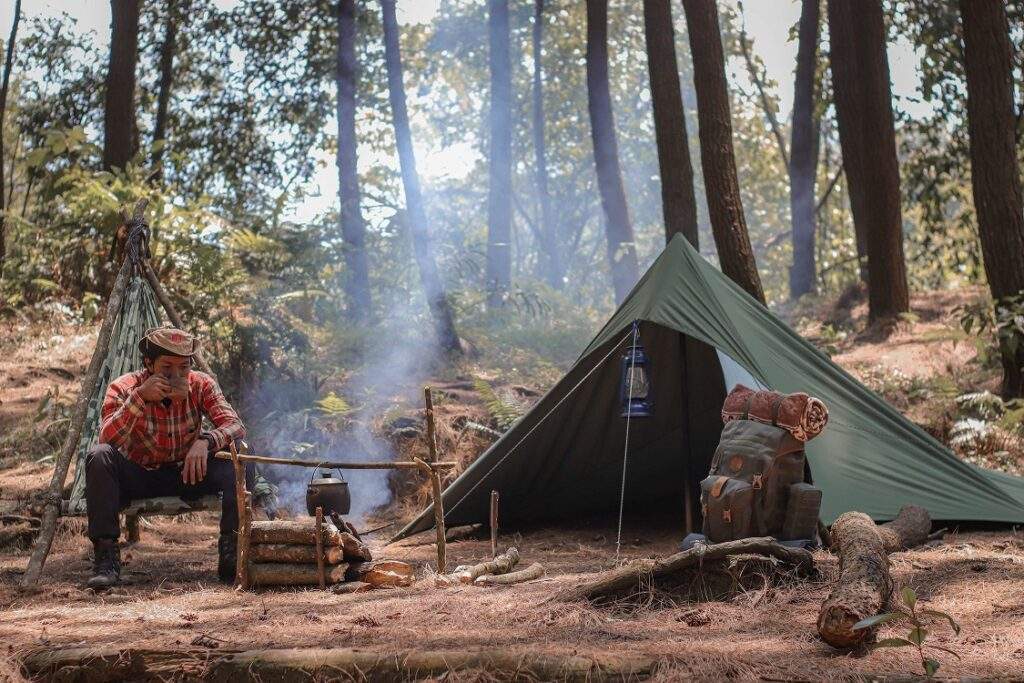Survival Cooking: Must-Have Kitchen Essentials for Camping in the Woods

Camping in the woods is a great way to escape your busy daily lives, and there’s nothing quite like sitting around the campfire while enjoying some good food. Hence, many people often go out for camping. According to the 2022 North American Camping Report, at least 7 million American households tried camping.
However, if you’re not prepared, camping can be miserable and unsafe, especially when cooking meals. Cooking outdoors takes extra effort because of limited supplies and resources, so you must bring everything you need to make delicious meals without compromising safety or comfort.
Fuel and Gas
You’ll need a source of fuel and gas to cook your meals. You have a few options here:
- Propane or butane gas canisters are significant for portable stoves, like this Coleman multi-fuel stove. They’re easy to use and require no additional parts, so you don’t have to worry about bringing extra fuel bottles or matches when camping. Plus, they’re easily refillable at most sporting goods stores. Hence, around 4.3% of all U.S. households use propane as their primary heating fuel.
- If you want something more traditional-looking, try using a campfire stove instead. These come in all shapes and sizes but are usually made from cast iron or steel. They have legs that raise them off the ground so they don’t burn out quickly on uneven terrains like grassy fields or sandy beaches.
A Sharp Knife
When you’re out in the woods, a sharp knife is one of the most essential items you can have. A dull knife can be dangerous and make cooking more complicated than it needs to be.
Here are some reasons why a sharp knife is beneficial during camping:
- Food preparation: A sharp knife makes cutting, chopping, and slicing food much easier and safer. Whether preparing fresh fish, fruits, vegetables, or other ingredients, a sharp knife ensures precision and reduces the risk of accidents.
- Firewood processing: When camping, you may need to gather firewood for cooking and keeping warm. A sharp knife can be used to baton wood or make feather sticks to aid in fire starting.
- Campsite setup: A sharp knife can clear small branches and vegetation around the campsite, making it more comfortable and safe.
- Utility tasks: From cutting ropes and cords to opening packages or repairing gear, a sharp knife is a versatile tool for various utility tasks around the campsite.
- Self-defense: While camping, you may encounter wildlife, and although it’s uncommon, a sharp knife could serve as a last resort for self-defense in extreme situations.
When carrying a knife while camping, it’s crucial to prioritize safety. Always store the knife in a sheath or secure it safely when not in use. Make sure to handle the knife carefully and responsibly to prevent accidents. Additionally, check local regulations and camping guidelines to ensure that carrying a knife is permitted in the camping area you’re visiting.
A Pressure Cooker
A pressure cooker is an essential tool for any camping kitchen. It allows you to cook meals faster, so you can spend more time enjoying the great outdoors and less time slaving over a hot stove.
When used properly, a pressure cooker can reduce cooking time significantly. However, if the pressure cooker is defective or has functional flaws, it can cause burns and injuries. But can a pressure cooker explode? Well, yes, it can.
According to TorHoerman Law, a defective cooker can explode, leading to severe burns and injuries. The website states that there can be several reasons causing the explosions, such as faulty gaskets, improper lid seals, improper ventilation, faulty release valve, etc.
This has happened to numerous people; many have already filed lawsuits against manufacturers of defective cookers. If you or a loved one has faced any such problem when camping previously or at home, you can file a pressure cooker lawsuit against the manufacturer.
A Small Cookware Set
The next thing you’ll need is a small cookware set. The best kinds are made from aluminum, which conducts heat well and doesn’t break as easily as glass or ceramic pans. You’ll also want pots and pans that can go on the stovetop or directly into the fire without getting damaged.
If you’re cooking over an open flame, look for lids that fit each pot. This will help keep your food from burning before it’s ready.
Food Preservation and Storage Solutions
There are a few options when it comes to storing your food and preserving it.
- Food can be stored in your cooler or ice chest for up to three days before it loses its freshness.
- Dehydrating is an excellent way of preserving fruits and vegetables so they last longer than if left out at room temperature. This process removes moisture from the food, which kills bacteria that cause spoilage and molding. It also makes packing easier since dehydrated items weigh less than their raw counterparts.
- Canning involves placing foods into jars with lids, then boiling them in a water bath or pressure cookers until sealed tight. You’ll also want a pressure cooker if you plan on canning meat or fish because these foods require extra heat treatment.
Essential Condiments and Seasonings
Next, you will need some essential condiments and seasonings to add to your food. Without these, your food won’t taste as good as at home.
- Mustard is a classic condiment that can be used to kick your food. It’s also great for adding flavor to bland dishes, like boiled meat or boiled potatoes.
- Ketchup is another classic condiment with almost anything, especially burgers.
- Mayonnaise is commonly added to salads, sandwiches, and other types of wraps when camping in the woods because it adds extra moisture.
- Vinegar is an excellent substitute for lemon or lime juice when making cocktails at home or while camping in nature’s wilds.
- Olive oil is an ingredient in salad dressings and sauteed foods such as onions or mushrooms because it adds richness without making them oily tasting.
- Salt & pepper should always be included on any camping trip since they’re essential ingredients for cooking any meal successfully.
- Cayenne pepper is something you might not think about using this spicy red powder when preparing meals outdoors. Cayenne pepper goes great with most meats, such as chicken thighs, which tend towards bland tasting unless appropriately seasoned beforehand.
Water Purification Methods
Water purification methods are essential when you’re camping in the woods. You need to be able to drink water that’s safe to drink, even if it’s dirty or has a sour taste.
- Boil your water for at least 5 minutes. This will kill most bacteria and viruses that could make you sick if they were in your water supply.
- Use filters on all your bottles and containers, including those of plastic or metal. Filters can help remove dirt particles from your drinking sources so that they don’t end up back in your mouth when you take a sip.
- A water disinfectant tablet can also help purify the water you drink in the woods, especially if you drink from a natural source at the camping site. You can use a water disinfectant like chlorine dioxide tablets to purify water. Even the Centers for Disease Control and Prevention (CDC) recommends it.
Conclusion
We hope this article has given you some insight into the types of equipment necessary for cooking in the woods. Remember, the most important thing is to have fun and enjoy yourself. The best way to do that is by being prepared with everything you need before leaving home.




